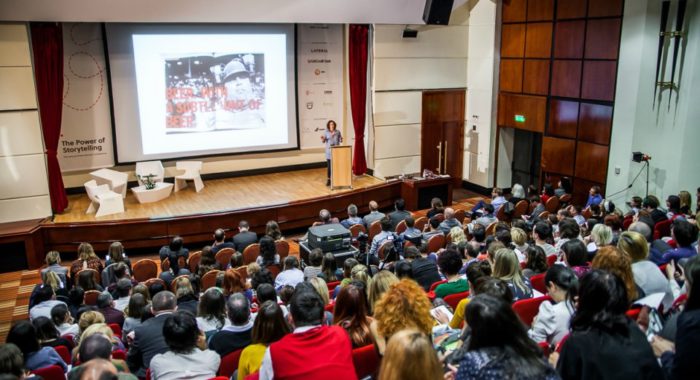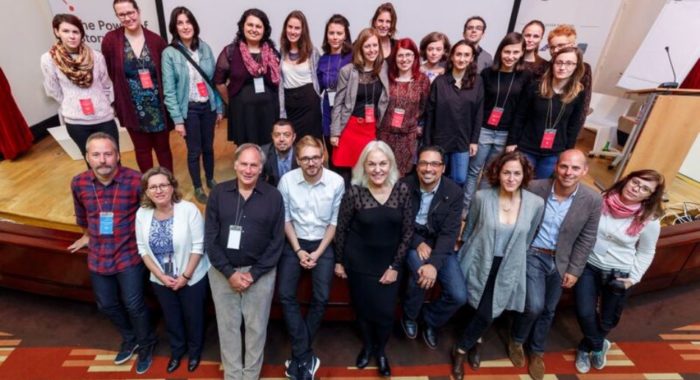Robert Krulwich was attracted to broadcasting ever since he was five years old and went by the pseudonym ‘Don Roberto’, a well-known radio host. Throughout the years, he continued to play pretend-reporter: he feigned being a chauffeur to get an interview with Simon and Garfunkel, and even sneaked into a hotel to talk to President Kennedy.
However, he didn’t pursue journalism immediately, but went on to study history at Oberlin College and law. He wanted to become a trial lawyer, just like Gregory Peck in To Kill A Mockingbird. But two months after receiving his Juris Doctor degree from Columbia Law School in 1974, he abandoned his pursuit of a law career to cover the Watergate hearings for Pacifica Radio.
”When I graduated law school and had this deep, haunting feeling that I’d made a mistake, and I didn’t have the talent or the character to be Gregory Peck, I asked myself: well, what can I do? What am I good at? And I thought, well, I’m good at explaining things. I like learning stuff and meeting people and who gets to do that?”, said Krulwich in a famous 2011 Commencement speech.
For 22 years, he was a science, economics, general assignment and foreign correspondent at ABC and CBS News. He won Emmy awards for a cultural history of the Barbie doll and for a Frontline investigation on computers and privacy, a George Polk for a look at the Savings & Loan bailout online advertising and the 2010 Essay Prize from the Iowa Writers’ Workshop.
Since 2014, Krulwich has been the co-host the Peabody Award-winning Radiolab, a podcast with over five million monthly downloads. On the show, Robert likes to experiment with basic journalism rules and new ways of telling stories. “You start with what you know, work backwards and add layers of abstraction”. Few people realize right away that Radiolab is essentially a podcast about science. And that’s because Robert and his co-host, Jad Abumrad, have sidestepped the conventions of traditional broadcast journalism, and managed to create a context in which people can connect with their work, discover stories and take pleasure as the hosts puzzle out the truth.
Krulwich mixes science and mystery into his news reporting, pondering such things as “How much does a hurricane weigh” or “Where does music come from”. He even managed to squeeze in an octopus story on primetime TV about Saddam Hussein. Curiosity is what propels Robert forward and this new form of journalism that he proposes brings along a sense of joyous discovery.
Here are some of the advice Robert Krulwich offered aspiring journalists at University of California, Berkeley in the same 2011 Commencement speech:
1. Think about not waiting your turn. Think about getting together with friends that you admire, or envy. Think about entrepreneuring. Think about not waiting for a company to call you up. Think about horizontal loyalty. Think about turning to people you already know and making something that makes sense to you together, that is as beautiful or as true as you can make it.
2. Suppose, instead of waiting for a job offer from the New Yorker, you go to your living room, sit down, and just do what you love to do. If you write, you write. You write a blog. If you shoot, find a friend, someone you know and like, and the two of you write a script. You make something. No one will pay you. No one will care, No one will notice, except of course you and the people you’re doing it with. But then you publish, you put it on line, which these days is totally doable, and then you do it again.
3. Fall in love with the work, with people you work with, with your dreams and their dreams. What I’ve noticed is that people who fall in love with journalism, who stay at it, who stay stubborn, very often win. I don’t know why, but I’ve seen it happen over and over.
4. Believe in your friends. Believe that what you and your friends have to say, that the way you’re saying it – is something new in the world. This is the era of Friends in Low Places. The ones you meet now, who will notice you, challenge you, work with you, and watch your back.
Book your place at the 5th edition of The Power of Storytelling to meet Robert and be inspired by his passion.



